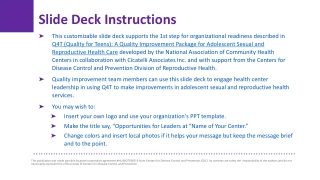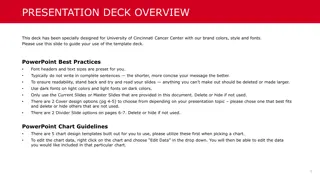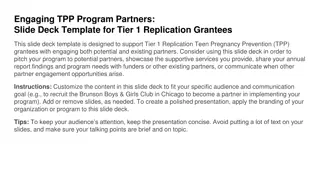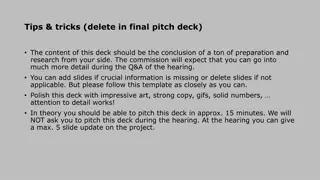
Impact of Interprofessional Continuing Professional Development
Explore the impact of evaluating the effectiveness of interprofessional continuing professional development (CPD) activities on team skills, strategies, performance, and outcomes. Challenges faced by institutions in assessing CPD outcomes and the role of competencies in interprofessional collaboration are discussed.
Download Presentation

Please find below an Image/Link to download the presentation.
The content on the website is provided AS IS for your information and personal use only. It may not be sold, licensed, or shared on other websites without obtaining consent from the author. If you encounter any issues during the download, it is possible that the publisher has removed the file from their server.
You are allowed to download the files provided on this website for personal or commercial use, subject to the condition that they are used lawfully. All files are the property of their respective owners.
The content on the website is provided AS IS for your information and personal use only. It may not be sold, licensed, or shared on other websites without obtaining consent from the author.
E N D
Presentation Transcript
EVALUATING THE IMPACT OF EVALUATING THE IMPACT OF INTERPROFESSIONAL INTERPROFESSIONAL CONTINUING PROFESSIONAL DEVELOPMENT CONTINUING PROFESSIONAL DEVELOPMENT Barbara Barnes, MD, MS University of Pittsburgh and UPMC
CPD Is a Unique Part of the Educational Continuum Content is diverse and not commonly part of a broader curriculum Formats vary and are often lecture-based Learners are commonly from disparate institutions and clinical environments Outcomes are traditionally focused on impact on the individual and are most often assessed through learner self-reports rather than observation of competence or performance
Joint Accreditation Criterion 13 Analyze changes in the healthcare team (skills/strategy, performance, patient outcomes) achieved as a result of the overall program s activities/educational interventions
Challenges for Pitt/UPMC > 1500 activities (medicine, nursing, pharmacy) Multiple types of activities (courses, series, web modules) Multiple planners from diverse settings Internal and external audiences representing multiple facilities and geographic areas Few examples of validated inter-professional outcomes measures for CPD Challenges in aggregating overall program level data in a meaningful manner
What is the Basis for Team Skills, Strategies, Performance & Outcomes IPEC Competencies Values/Ethics for Interprofessional Practice. Roles/Responsibilities. Interprofessional Communication. Teams and Teamwork.
Interprofessional Collaboration Competency Attainment Survey (ICCAS) Validated 20-item self-report instrument rooted in the IPEC competencies and designed to assess behaviors associated with patient-centered, team-based, collaborative care. Communication Collaboration Roles and responsibilities Collaborative patient-family centered approach Conflict management/resolution Team functioning Has been used primarily in pre-professional and undergraduate education how can it be applied to CPD?
How We Have Categorized Our CPD Activities TYPE OF ACTIVITY TOPICAL CATEGORIES EXPECTED OUTCOME LEVEL (Varies depending on nature of audience) Moderate Moderate Moderate Moderate Moderate Moderate Moderate Low Moderate High High Moderate Low Low Formal Courses Administration Education Research Skills Ethics QI Multiple Topic Clinical Single Topic Clinical Case Conferences QI Committees Clinical Non-Clinical Series Enduring Materials All
Implementation of Our IP CPD Evaluation Strategy Activity categorization schemas have been used for more than 5 years for CME activities In preparation for Joint Accreditation: General Likert question (improvement in functioning on an IP team) and an open-ended questions about IP impact added in 2017 ICCAS questions added in 2018 for formal courses Full instrument being implemented in 2019
Outcomes for Series Activities General Question: As a result of participating in this activity, to what degree will you improve your ability to function on an interprofessional team? < 5 point Likert scale, very low to very high> Case conferences: 4.37 QI Committees: 4.34 Clinical Conferences: 4.27 Non-Clinical Conferences: 4.21
Outcomes for Formal Courses Outcomes for Formal Courses ICCAS GENERAL: FUNCTION IN AN IP TEAM PROMOTE COMMICATION IN AN IP TEAM WORK CLOSELY IN AN IP TEAM IDENTIFY ABILITIES TO WORK IN AN IP TEAM 4.57 (1) INCLUDE PATIENTS & FAMILIES IN DECISIONS 4.45 (2) CONSIDER IDEAS OF IP TEAM MEMEBERS 4.57 (2) DEVELOP CARE PLANS WITH THE IP TEAM 4.49 (2) MEAN ICCAS ETHICS 4.51 (1) 4.30 (2) 4.45 (1) 4.47 (2) ADMIN 4.44 (2) 4.50 (1) 4.44 (2) 4.42 (2) 4.65 (1) 4.65 (1) 4.56 (1) 4.54 (1) SKILLS 4.26 (3) 4.28 (3) 4.18 (3) 4.20 (6) 3.80 (6) 4.34 (3) 4.28 (4) 4.18 (4) QI 4.24 (4) 4.20 (4) 4.18 (3) 4.26 (5) 4.10 (3) 4.27 (4) 4.34 (3) 4.23 (3) MULTI- TOPIC 4.20 (5) 4.14 (5) 4.00 (5) 4.29 (3) 4.05 (5) 4.12 (5) 4.06 (5) 4.11 (5) SINGLE TOPIC MEAN 4.28 4.00 (6) 4.14 (5) 4.00 (5) 4.29 (3) 4.05 (5) 4.12 (5) 4.06 (5) 4.11 (5) 4.26 (4) 4.21 (5) 4.34 (2) 4.18 (6) 4.35 (1) 4.30 (3) 4.27
Conclusions Conclusions The ICCAS instrument, which aligns with the IPEC competencies is a useful tool for assessing IP CPD activities Categorization of activities within a large and diverse CPD program according to level of anticipated outcomes is a useful means for collecting meaningful data and prioritizing resources. We are in the early stages of our work but preliminary results are promising. Further research and assessment are required to identify and implement valid outcomes measurement in IP CPD.






















